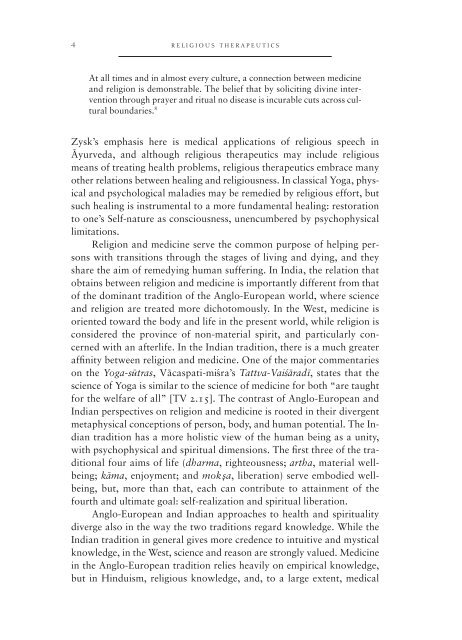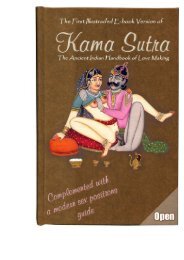body and health in yoga, Ayurveda, and Tantra
body and health in yoga, Ayurveda, and Tantra
body and health in yoga, Ayurveda, and Tantra
You also want an ePaper? Increase the reach of your titles
YUMPU automatically turns print PDFs into web optimized ePapers that Google loves.
4 religious therapeutics<br />
At all times <strong>and</strong> <strong>in</strong> almost every culture, a connection between medic<strong>in</strong>e<br />
<strong>and</strong> religion is demonstrable. The belief that by solicit<strong>in</strong>g div<strong>in</strong>e <strong>in</strong>tervention<br />
through prayer <strong>and</strong> ritual no disease is <strong>in</strong>curable cuts across cultural<br />
boundaries. 8<br />
Zysk’s emphasis here is medical applications of religious speech <strong>in</strong><br />
Åyurveda, <strong>and</strong> although religious therapeutics may <strong>in</strong>clude religious<br />
means of treat<strong>in</strong>g <strong>health</strong> problems, religious therapeutics embrace many<br />
other relations between heal<strong>in</strong>g <strong>and</strong> religiousness. In classical Yoga, physical<br />
<strong>and</strong> psychological maladies may be remedied by religious effort, but<br />
such heal<strong>in</strong>g is <strong>in</strong>strumental to a more fundamental heal<strong>in</strong>g: restoration<br />
to one’s Self-nature as consciousness, unencumbered by psychophysical<br />
limitations.<br />
Religion <strong>and</strong> medic<strong>in</strong>e serve the common purpose of help<strong>in</strong>g persons<br />
with transitions through the stages of liv<strong>in</strong>g <strong>and</strong> dy<strong>in</strong>g, <strong>and</strong> they<br />
share the aim of remedy<strong>in</strong>g human suffer<strong>in</strong>g. In India, the relation that<br />
obta<strong>in</strong>s between religion <strong>and</strong> medic<strong>in</strong>e is importantly different from that<br />
of the dom<strong>in</strong>ant tradition of the Anglo-European world, where science<br />
<strong>and</strong> religion are treated more dichotomously. In the West, medic<strong>in</strong>e is<br />
oriented toward the <strong>body</strong> <strong>and</strong> life <strong>in</strong> the present world, while religion is<br />
considered the prov<strong>in</strong>ce of non-material spirit, <strong>and</strong> particularly concerned<br />
with an afterlife. In the Indian tradition, there is a much greater<br />
aff<strong>in</strong>ity between religion <strong>and</strong> medic<strong>in</strong>e. One of the major commentaries<br />
on the Yoga-sūtras, V¯acaspati-mi´sra’s Tattva-Vai´sārad¯ı, states that the<br />
science of Yoga is similar to the science of medic<strong>in</strong>e for both “are taught<br />
for the welfare of all” [TV 2.15]. The contrast of Anglo-European <strong>and</strong><br />
Indian perspectives on religion <strong>and</strong> medic<strong>in</strong>e is rooted <strong>in</strong> their divergent<br />
metaphysical conceptions of person, <strong>body</strong>, <strong>and</strong> human potential. The Indian<br />
tradition has a more holistic view of the human be<strong>in</strong>g as a unity,<br />
with psychophysical <strong>and</strong> spiritual dimensions. The first three of the traditional<br />
four aims of life (dharma, righteousness; artha, material wellbe<strong>in</strong>g;<br />
kāma, enjoyment; <strong>and</strong> mokÓsa, liberation) serve embodied wellbe<strong>in</strong>g,<br />
but, more than that, each can contribute to atta<strong>in</strong>ment of the<br />
fourth <strong>and</strong> ultimate goal: self-realization <strong>and</strong> spiritual liberation.<br />
Anglo-European <strong>and</strong> Indian approaches to <strong>health</strong> <strong>and</strong> spirituality<br />
diverge also <strong>in</strong> the way the two traditions regard knowledge. While the<br />
Indian tradition <strong>in</strong> general gives more credence to <strong>in</strong>tuitive <strong>and</strong> mystical<br />
knowledge, <strong>in</strong> the West, science <strong>and</strong> reason are strongly valued. Medic<strong>in</strong>e<br />
<strong>in</strong> the Anglo-European tradition relies heavily on empirical knowledge,<br />
but <strong>in</strong> H<strong>in</strong>duism, religious knowledge, <strong>and</strong>, to a large extent, medical



